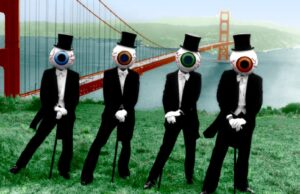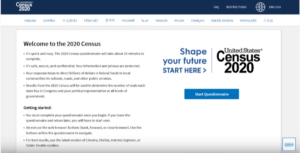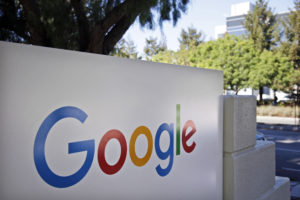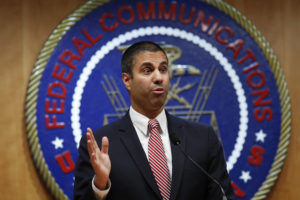Save Internet Music
Internet radio has provided an eclectic and independent alternative to the mainstream hit-oriented, payola-ridden music marketplace, but industry greed now threatens to wipe out the medium. Truthdig checks in with Frannie Wellings of Free Press to find out whether Internet radio stands a chance and what music fans can do to save it.
Internet radio has provided an eclectic and independent alternative to the mainstream hit-oriented, payola-ridden music marketplace, but industry greed now threatens to wipe out the medium. Truthdig checks in with Frannie Wellings of Free Press to find out whether Internet radio stands a chance and what music fans can do to save it.
Click here to listen to this and other Truthdig interviews.
Transcript:
James Harris:
This is Truthdig. James Harris sitting down with Josh Scheer, and on the phone, Frannie Wellings. She is the associate policy director at Free Press, where she lobbies key national legislative and governmental staff on media and telecommunications issues. Today we’re talking about something that is near and dear to our heart, and any of you guys out there who listen to podcasts, who listen to Internet radio. There’s a possibility, at least in Josh’s mind, that Internet radio could go away. So we thought that we’d talk to Frannie Wellings. Frannie, can you make this plain for us? What’s the status of Internet radio today?
Frannie Wellings: Sure, well, Internet radio is really at risk today. A board called the Copyright Royalty Board has set Internet radio rates so high that many webcasters who are streaming music across the Web will actually have to go out of business. They’ve set the rates so high that some of them … it’s even at 150 percent of their revenue. This applies to noncommercial radio, like NPR. It applies to smaller webcasters who are playing the diverse music that isn’t found on regular radio stations. It even applies to the larger webcasters like Yahoo who right now are trying to play a little bit more diverse music but will move to this sort of top four record companies’ kind of style of pop music if they are stuck with these rates as well.
Josh Scheer: I was reading the interview we had on Truthdig with Pandora’s Box founder. It seemed interesting but he kind of made it seem that it was just affecting the Web, but you’re saying this actually affects small radio stations and emerging radio stations.
Wellings: It is just the Web, but groups like NPR actually are streaming a lot of their music now online. So it’s their Internet radio operations of groups like National Public Radio that are going to be affected, which means that they really can’t expand to new technologies in the way they want to. Because, for a group like NPR, their mission is to educate the public, to expand listenership, and this actually makes them fear their listeners, because with every new listener listening to every new song, they’re going to have to pay a bit more. And that just goes against the grain of the mission of public broadcasting.
Scheer: Again, with this interview I was reading on our site — I read part of it, but then I was reading it obviously for the background on this issue — he was saying that terrestrial radio right now isn’t paying and satellite pays only a very little amount. Is that the case? Are they not paying when it’s broadcast over air in a kind of a terrestrial form?
Wellings: Exactly. The broadcasters, regular terrestrial broadcasters, do not pay the actual artists and performers of the songs that you hear on the radio. It’s sort of the problem with music where the RIAA, the recording industry and the record companies, tend to be the ones that reap the profits from songs and the actual musicians, performers, are not actually getting those profits. With Web radio they actually are getting profits, and that’s part of the good part about Web radio. We want to make sure that that stays, that that is the case, that that remains. And satellite as well. But the problem is that satellite has a reasonable fee. The webcasters’ fee has been set so high that it’s just going to kill the medium, and that’s not going to do anything for artists in the end. That’s actually going to hurt artists in the end. So we want to set a fee that’s fair and balanced for everybody across the board so that artists are paid and webcasters can survive.
Scheer: So you’re not just advocating getting rid of fees altogether; you guys just want a reasonable fee.
Wellings: Exactly.
Harris: But what’s the fee? NPR doesn’t play a whole lot of music, so what kind of fees are they up against versus somebody who’s playing Jay-Z, who’s playing Norah Jones? What kind of fees do they have to pay?
Wellings: The problem is, it’s a little bit confusing. For a group like NPR there is a minimum amount of songs, and for that they would pay a fee of $500 and then above that it goes to aggregate tuning hours, and so you’re looking at the number of listeners listening to the number of songs. And for that most of the stations have analyzed how much they play and they think that they’re going to be paying a whole heck of a lot of money. These fees are also backdated to the beginning of 2006, so many of these webcasters are going to owe millions of dollars, suddenly, as soon as this ruling goes through.
Harris: So this is as expensive as a million, so we couldn’t cover the cost if we put our three pocketbooks together here. [Chuckles.]
Wellings: You know, it would probably exceed your revenue. That’s exactly the case.
[Laughter.]
Scheer: Now this is an important question because there’s another issue that I want to clear up because, again, you read one thing and it says something different. I’m a little bit confused. This is only affecting music. This isn’t affecting … a podcast … if we do a radio show that maybe we pick it up. … This is just for music, right?
Wellings: This is for songs.
Scheer: For songs.
Wellings: Exactly.
Scheer: Does this affect buffer music [music played beneath talking], too?
Wellings: I don’t know the answer to that, but I believe that this is regular songs that are copyrighted. Basically, there’s a group that’s called SoundExchange …
Scheer: Hmm.
Wellings: … that’s been set up by the RIAA. They’re the ones that are collecting the fees. So SoundExchange finds an act, a musical act, and says, “OK, your music is being played on the Web. This is how much you should be owed, we believe,” and they’re supposed to pay them. Now that doesn’t all work out so well, SoundExchange. It seems to be a little bit of a messy business there. There isn’t any clear way of tracking what songs have been played, by which artists, and ensuring that that fee has gone to the actual artists. But in the end, they’re the ones defining it. So I would imagine it’s not the buffer music; it’s the regular music that you can find online.
Scheer: In their minds, do you think this like a rebirth of Napster? Are they afraid this music is just being stolen and that they just can’t comprehend the technology? Or is this just — ? It seems kind of vindictive if terrestrial radio doesn’t have to pay and Web radio does.
Wellings: Hmm.
Scheer: People can’t download this music. This isn’t stealing software. This is just a radio station that happens to be based on the Web to avoid the FCC.
Wellings: Exactly. I think, though, that this is partially. … Everybody is grateful that Internet radio pays artists and performers. This, I think, generally — to be blunt — comes from the greed of lawyers and of the recording industry who pushed too far for too much money. And they’ve gotten their wishes, but at the same time, it’s the artists in the end who are going to be hurt.Scheer: I want to actually just read something. I’m kind of impressed by Sen. [Ron] Wyden from Oregon, his comment on this. “Our bill was about standing up for folks ranging from a small webcaster in a basement in Corvallis to an innovative start-up in Beaverton, to a band trying to be heard in Portland, to a huge music band in Coos Bay.” Those are all Oregon cities; I’m sure he’s speaking to his base. “Keeping Internet. … ” And this is, again, his speech. “Keeping Internet radio alive is part of the broader issue that is important to me: keeping the e-commerce engine running by preventing discrimination against it.”
So his basic premise is that this is actually good for business.
Wellings: Exactly.
Scheer: That artists get played more, and maybe the smaller artists. Do you agree with that?
Wellings: Yes. This is good for music in general because if you don’t see Congress act and reset these rates, and if the ruling sticks with the Copyright Royalty Board, you’re going to see less diversity in music online. Many of these smaller webcasters who play international songs or classical songs or underground hip-hop, or a variety of things, are not going to be there to play them. And the larger, sort of massive webcasters, they are going to — instead of having some streams that are playing those diverse music channels, they are actually going to have to be playing the same old pop hits, and nobody wants that. And I think in the end it’s going to be much better if we actually get this corrected. Satellite companies pay — I think it’s around 7 or 8 percent — of their revenue to the artists and performers to compensate them, and this, Sen. Wyden’s bill, would adjust the Internet radio royalty rates so that they would also be paying the same as satellite. So making it a little more … parallel with them and more balance in the industry. Unfortunately, terrestrial broadcasters should be paying as well. They really should be compensating the performers, and it would be nice if something were done about that.
Scheer: Again, it seems a bit foolhardy because Internet, you guys are willing to pay, satellite’s already paying, right? And terrestrial radio is not. So the Royalty Copyright Board — I understand their purpose, I feel for these artists who don’t make any money and people just take their stuff. But you guys are willing to pay, I mean the Internet’s willing to pay, satellite is and terrestrial’s not. It seems almost unfair and seems like they put their attention to the wrong industry, right?
Wellings: Hmm. Exactly. I think that’s exactly the case. So now we’ve got these, we’ve got two bills, we’ve got Sen. Wyden and Sen. [Sam] Brownback, who have introduced their bill, and in the House we’ve got Congressman Jay Inslee and Congressman [Don] Manzullo, who have introduced their bill as well. They introduced in April. The deadline is really sort of July 15th right now, when the webcasters are going to have to start paying these fees backed up through 2006, and so we’re really hoping to get a good congressional push before July 15th.
Scheer: If I’m angry and I want to do something about it. If you have a phone number, I always recommend not yelling and screaming because you don’t want to shoot the messenger, but do you recommend — because I have their address — do you recommend sending them letters to the Copyright Board? Do you recommend any certain action that we can take as people who obviously like to listen to music?
Wellings: Unfortunately, the Copyright Royalty Board is not listening to anybody. After their decision came out on March 2nd there was a massive outcry. A lot of these webcasters had things on their websites and said things on their screens and actually tried to get people contacting the Copyright Royalty Board. We sent in thousands of petition signatures from Free Press and they just said, “We’re not rehearing this case. We will listen, to see if there are additional arguments, to people who have filed already, but we’re really not interested in retrying this.” So now the question is whether SoundExchange, that group that was set up by the RIAA, whether they can be pressured, since the deals could be cut through them. But I think in the end we just need, we really need congressional pressure on this industry to ensure that these rates are fair and reasonable. So I would say, for anybody listening, that they should be contacting their member of Congress, that that’s probably the best way to go at this point, and just telling them that they support the Wyden and Brownback bill on Internet radio equality [the proposed Internet Radio Equality Act] and the Inslee and Manzullo bill in the House.
Scheer: Can the Supreme Court or somebody like that get involved, or is this an issue of kind of like Soviet court where they have, like, three judges that we don’t really know who they are and they just get to make a ruling? Congress gets to do something, but does the court have a say in this? … I know there’s no Fairness Doctrine anymore, but at least, you look at it from the point of view of terrestrial radio pays nothing and Internet pays everything, right?
Wellings: Hmm. Yes.
Scheer: So it can go to the Supreme Court?
Wellings: There’s nothing in relation to, that terrestrial broadcast radio pays nothing, unfortunately. But NPR and others are appealing this decision in court, and the status of that. … I don’t know the status of that currently, but I think they are looking more to Congress than to the court in order to fix this.
Scheer: I’m glad it’s not Russia and this isn’t just some kind of shady deal.
Wellings: [Chuckles.]
Scheer: I’m glad this is at least America so we have the courts.
Harris: Well, you let Vladimir Putin tell it, this is a lot like Russia, or Nazi Germany. My question, to bring some closure to this — and not to diminish the work that Frannie Wellings, whom we are on the phone with, the associate policy director at Free Press. Not to diminish any of the work that you’re doing, but do you think this is the beginning of regulation of the Internet across the board? In five years, are we looking at the same Internet or a very government-protected Web?
Wellings: I actually don’t, because there was a Small Webcasters Act a few years ago, and we actually had to do the same thing to try to protect the fees that small webcasters and noncommercial webcasters paid, to keep them lower and make sure that it was fair. So I think there is — there has always been light regulation of the Internet. And when it comes to free-speech issues is when it gets questionable, right? But I think that when you get to issues like this, when you get to an issue like network neutrality, you know, making sure there’s nondiscrimination of all the applications on the Internet, those type of things are sort of light touches of regulation that sort of have to be there to ensure that the Internet is run properly and that people who have more power can’t keep out those who have less.
Scheer: I just want to say one thing about Sen. Brownback. I think it’s impressive that — you know, he’s running for president — that he would come out and say this. He did make a statement. I know I read the Wyden statement, but his statement was also good. This is a bipartisan issue; this is not some issue that Democrats or Republicans or Greens can just say, oh, just reject it. I think Brownback also made a good point when he said he was alarmed by this. He likes Internet radio. We all like Internet radio. So I’m glad you got to come in here and tell us more about Internet radio and why we should save it.
Wellings: I hope that everybody gets involved and contacts their member of Congress and supports these bills so that we can actually ensure that Internet radio can actually continue to function as a really good diverse alternative to terrestrial radio…
Harris: We will certainly do our part. Frannie Wellings, thank you for dropping by and spending the time with us. For Josh Scheer, for Frannie Wellings, associate policy director at Free Press, this is James Harris, and this is Truthdig.
Your support matters…Independent journalism is under threat and overshadowed by heavily funded mainstream media.
You can help level the playing field. Become a member.
Your tax-deductible contribution keeps us digging beneath the headlines to give you thought-provoking, investigative reporting and analysis that unearths what's really happening- without compromise.
Give today to support our courageous, independent journalists.








You need to be a supporter to comment.
There are currently no responses to this article.
Be the first to respond.